Taste the Globe With Recipes From New York’s All-Grandma Kitchen Crew
Nonnas of the world, unite!
When Jody “Joe” Scaravella opened Enoteca Maria in 2008, he was sorely in need of a grandmother. Scaravella grew up in an Italian neighborhood in Brooklyn, where his Nonna Domenica cared for him while his parents worked.
“I remember her going to the market everyday, bringing her shopping cart,” Scaravella writes. “She stopped at the vegetable shops and bit a peach or tasted a cherry.” If the fruit was up to her standards, Domenica bought it. “Otherwise, she spit it on the ground with a disgusted expression on her face.” None of the shopkeepers complained about her trail of half-bitten peaches. Then again, the whole neighborhood knew Nonna Domenica, and who would dare come between an Italian grandmother and fresh produce?
These shopping trips sowed the seeds of Scaravella’s love of food, and his respect for the family elders, usually women, who pass down culinary heritage. It was this passion that guided him when, in 2008, freshly reeling from the loss of his grandmother, mother, and sister in just a few years, he decided to open up an Italian restaurant. But this wouldn’t be any old Staten Island red-sauce joint. Enoteca Maria would be staffed not by Michelin-starred chefs, but by Italian grandmothers.

The concept took off. Soon, Enoteca Maria was packed, and the grandmothers were appearing in local news and digital documentaries. In 2015, Scaravella expanded the Enoteca vision to include a rotating cast of grandmothers—specifically, female elders who were primarily home cooks—from around the globe. For the past few years, the restaurant’s weekend dinners have been cooked by one of dozens of enterprising elders, described by Scaravella as the “Nonnas of the World,” who offer full menus based on their home cuisines.
The resulting atmosphere is fiercely joyous, and as sprawlingly diverse as the City itself. In February 2020, the restaurant featured nine different Nonnas, including chefs from Morocco, Brazil, and Uzbekistan. March and April’s lineups were poised to include Nonnas with roots in Argentina, Greece, Sri Lanka, and Puerto Rico. Then came the coronavirus.

Like most restaurants across New York City, Enoteca Maria has closed shop in light of social-distancing restrictions. “Our motto is ‘grandmother’s kitchen,’” says Scaravella. “The grandmothers are the most vulnerable among us, so we shut down.” Scaravella has instead converted his kitchen to make weekly batches of soup for first responders; so far, they’ve served lentil, butternut squash, and chicken. “It keeps me busy,” he says.
Meanwhile, with the exception of essential workers, New Yorkers, including the Nonnas, have largely hunkered down at home. Half of the city is currently struggling to afford food, and many of those who do have the money for groceries are too medically vulnerable to risk a trip to the store. At a moment when community elders are at heightened risk, the Nonnas’ knowledge—often gleaned from decades of spinning culinary joy from limited ingredients—is especially precious.
I caught up with four of the Nonnas who were slated to chef this past month: Ploumitsa Zimnis from Greece, Carmen Bernardo from Argentina, May “Dolly” Joseph from Sri Lanka, and Irene Rivera from Brooklyn, with roots in Puerto Rico. They shared stories of how they had come to join Nonnas of the World, how they were faring during social distancing, and the recipes giving them comfort.

Nonna Carmen
When Carmen Bernardo picks up the phone, she immediately launches into a recipe.
“Yo ahora estoy haciendo un pollo con batata,” she tells me. “Right now I’m making chicken with sweet potatoes.” Bernardo came to the United States from Buenos Aires eight years ago to help her son and his wife care for their newborn daughter.
My Spanish is slow; she is patient. Dapples of unexpected light shine through the cracks in our conversation. When I mistakenly ask her, “How can I learn how to cook?” rather than, “How did you learn how to cook?” she nonetheless gives a revealing answer. “That’s easy,” she says. “With love!”
Talking to Bernardo, that love crackles over the phone. She’s spent the past few days making more than 100 fabric masks for her neighbors in Perth Amboy, New Jersey. But her first foray into the power of all things handmade came 65 years ago, as a child watching her mother make pastel de carne—meat and potato pie—and empanadas. “From when I was a little girl, I loved to cook,” she says.
Now, two generations and thousands of miles removed, Bernardo has recreated those memories in Enoteca Maria. Bernardo was originally hesitant when she went for her initial interview with Scaravella, in response to an ad he’d posted searching for home cooks.
“I said I just make homemade food, home-style, my mother’s food, my grandmother’s,” she says. “He said this is what we want: grandmothers’ cooking. So I started.” She’s been filling Enoteca Maria’s kitchen with the carmel-sugar scent of panqueques con dulce de leche, thin, crepe-like dulce de leche pancakes, ever since.
Bernardo’s cooking style remains improvisational. “I’m not very good with electronics,” she says when I ask her to send a recipe. Besides, she doesn’t have precise measurements to share. “We do it by eye.” So, in classic grandmother style, Bernardo dictates a freeform recipe for bifes a la criolla, stewed steak with onions, tomatoes, and peppers, over the phone. “Look, you make it like this,” she says.
Nonna Carmen’s Bifes a la Criolla
- Oil
- Beef or veal, thinly sliced
- A few onions, sliced
- A few peppers, sliced
- A few tomatoes, sliced
- Salt, oregano, and paprika to taste
In a pan with a little oil, lay down a layer of beef slices. On top of that, put sliced onions, sliced peppers, and sliced tomatoes. On top of that, put another layer of meat. Then repeat: onion, pepper, tomatoes. Finally, you add chopped potatoes. Season it with salt, oregano, and paprika. Cook it on the stove on medium heat, covered, for 45 minutes to an hour. Then it’s ready!

Nonna Ploumitsa
Ploumitsa Zimnis came to Enoteca Maria during a time of mourning. In July 2016, Zimnis lost her husband. For two months afterward, she says, “I stay home and cry and cry.” One day in late summer, Ploumitsa received an intriguing message from her daughter, Maria Zimnis: A restaurant on Staten Island was hiring grandmothers to cook. Would Ploumitsa try out?
“I just saw an advertisement on Craigslist looking for international grandmothers,” Maria Zimnis says. At first, Maria was suspicious. “Who would want grandmothers?” she asked herself. “I thought it was some kind of scam.”
Despite their skepticism, on September 4, 2016, Ploumitsa’s birthday, the pair traipsed from their home borough of Queens to Staten Island to meet with Scaravella. At first, Ploumitsa was shy. “I said, ‘I don’t know, I’m not very good. I never worked in a restaurant,’” Ploumitsa says.
But when she met two of the Italian Nonnas, the chemistry was immediate. “She went over there hugging and kissing. They didn’t know each other. But they just took to each other,” Maria says.
Ploumitsa grew up on the lemon-bright Greek island of Chios. Her childhood was scented with its flavors: salt, squid, mastic. She watched her mother make chicken soup with lemon and delicate handmade macaroni, each hole formed around a thin stick plucked from a local tree.
In 1969, newly married, Ploumitsa and her husband boarded a ship to America. “It took 51 days to come to America,” she says. When she arrived, New York harbor was drab with autumn. “It was so dark, the day, the port,” she says. “I don’t like it over there. I don’t feel good.”
Soon, however, her feelings about New York changed. Ploumitsa’s husband owned a restaurant, but she cooked at home, drawing on his lessons and handwritten recipes from her mother. Over years of experimentation, she became a master chef and baker, trying out pastry recipes on her coworkers at a New York Public School cafeteria.

As a younger woman, Ploumitsa had fought to work outside of the home. When she started cooking at Enoteca Maria, this entrepreneurial spirit kicked into full gear. She began posting videos of her creations online; before long, Maria Zimnis, who works at the City Board of Education, found herself in a second full-time job as her mother’s social media manager.
Now, Nonna Ploumitsa’s Instagram and Facebook feeds overflow with recipes and videos in English and Greek, and she manages a direct-order online shop—all part of what she calls her budding “baking empire.” Maria says that translating Ploumitsa’s intuitive style to standardized recipes is a challenge. “She doesn’t use measurements at all. Everything is based on texture, how things feel, how it looks.”
Ploumitsa was scheduled to cook a Lenten codfish recipe at the Enoteca in March—she cooks every year on Greece’s Independence Day—but her session was cancelled because of COVID-19. Instead, she’s keeping herself busy at home by candying oranges, frying pastries, and posting everything on social media. When her children drop off groceries to her apartment, Ploumitsa keeps a few things for herself, and returns the rest to her doorstep in the form of ornate meals for her family.
Nonna Ploumitsa’s Fava Bean Soup
- 2 cups fava beans
- 5 cups water
- 2 medium red onions coarsely chopped
- 1 garlic clove
- ¾ cup extra virgin olive oil
- Salt and pepper to taste
- 20 cm sprig of fresh dill (or 1/2 teaspoon dried)
- 1 lemon
- Olive oil, Kalamata olives, and fresh onions to garnish
Wash fava beans. Pour water in a pot over medium heat, add fava beans, and leave pot uncovered. Once water boils, remove all the foam that appears on the surface. Add chopped onions and whole garlic, olive oil, salt, and pepper and bring to a boil. Lower heat to a simmer. Cover pot and stir fava regularly with a wooden spoon to prevent it from sticking, for about an hour. Add dill and continue to simmer for an additional 15 minutes. Once cooked, remove from heat and squeeze fresh lemon juice over fava and stir.
When serving, drizzle olive oil on top, and garnish with Kalamata olives and fresh onions. Served with a side of tuna fish in olive oil, and olive bread.

Nonna Dolly
When I ask May “Dolly” Joseph how it feels to be a famous chef, she laughs. “I don’t know about that,” she says. But when she talks about the recognition of her work at Enoteca Maria—the Nonnas have appeared in several television shows and documentaries—you can feel her smile, even from a distance. “Once there were two little children, not even 10 years old,” she recalls. “They said, ‘Oh, that’s the Nonna we saw on TV.’ It’s a nice feeling.”
Joseph was born just outside of Colombo, Sri Lanka. When a nanny held the chubby baby, she called her “my doll.” The nickname Dolly stuck.
As is common among middle and upper-class households in South Asia, Dolly grew up eating food cooked by domestic workers. When, at 13, her family no longer had the money to pay cooks, she and her sister learned to cook themselves. They would skip to the store after school for sugar, pluck coconuts from the trees in their gardens, and make sweets: fluffy marshmallows, sticky milk toffee, cinnamon- and rose water-scented Sri Lankan “love cakes.”
Dolly became a caterer, and when she migrated to Staten Island some 20 years ago, she began making mail-order sweets for diasporic Sri Lankans. For the past few years, she’s been serving Enoteca guests fish, meat, and vegetable curries with rice and hoppers (egg-filled rice-flour crepes) several times a month.
Usually at this time of year—much of Sri Lanka celebrates New Year in April—business would be booming, as Dolly fries rice flour- and coconut-milk-based sweets to send to customers for the holiday. But this year, like the rest of New York, Dolly is stuck inside. Sheltering in place in her Staten Island home, Dolly still has culinary projects, and phone calls with friends, to lighten her days.
“I’m very happy when I cook,” she says, though she’s happier cooking for a crowd. “When they say, ‘The food was good, Dolly,’ that is like going to heaven.”
Nonna Dolly’s Lentils
- 1 cup of yellow lentils
- 1/4 teaspoon turmeric
- Salt to taste
- 1 small onion, chopped
- 4 cloves of minced garlic
- A few curry leaves
- 1/4 teaspoon mustard seeds
- 2 tablespoons oil
- Crushed chili to taste
- ¼ cup milk
Rinse the lentils four to five times. Put them in a pan with the salt and turmeric powder. Cover it with water and boil until tender. Once it’s boiled, add the milk and let it be for about five to seven minutes. Then, heat the oil in a separate pan. Once it’s hot, add the mustard seed, and after two minutes, add the onions, garlic, curry leaves, and the crushed chili. Once the spices are fried, add the cooked lentils and let it cook for two more minutes. Stir well.

Nonna Irene
Irene Rivera may be the only former NYPD detective turned member of an all-grandma culinary crew. Rivera, who grew up in a Puerto Rican family in Brooklyn, served on the force for 21 years. After retirement, she filled the gap in an unusual way when, in search of a creative project, she signed on to cook at Enoteca Maria. “I miss it in a way, the camaraderie that you get from your brothers and your sisters” on the force, she says. “You get that too from the restaurant.”
Rivera never learned to cook, exactly: She absorbed it. “If you know anything about Latino, Hispanic families, little girls go into the kitchen,” she says. “We just watched and helped, and by the time you’re eight or nine, you pretty much have it all together.”
When she had children of her own, those early lessons returned in a flood of sensory memory. “It just comes back to you like nothing,” she says. The flavors of her childhood, which she recreates in Enoteca Maria, are “humble”—salted cod, corn meal—with roots in the meals of agricultural laborers. Now, when she cooks in the Enoteca, she lets her intuition, and a strong sense of scent, guide her. “Now what I do is to recreate the same flavor, the same smell,” she says.
As she shelters in place with her husband and grandchildren in Staten Island, food offers a rare form of continuity. “It’s scary at this time,” she says. When the quarantine lifts and her children come back to visit—from upstate, from Maryland, and from right there on Staten Island—they will be embraced by the same scent Rivera associates with her own grandmother.
Nona Irene’s Sofrito and Salted Cod
Sofrito
- 4 to 6 cloves of garlic
- 1 small onion
- 1 green pepper
- 1 red pepper
- 1 handful of fresh cilantro
- 1 handful of fresh culantro
- 2 teaspoons of cumin
Place ingredients in a mixer and you will have a fresh, pungent mix of sofrito. You can place in ice cube trays and use as needed. It can last for six months if covered.
Salted Cod
- 1/2 pound of salted cod fish, soaked overnight and rinsed (find true cod fish that has been salted—many brands use hake or other fish because it’s less inexpensive)
- 8 ounces of tomato sauce (any kind will do)
- 1 bag of frozen okra, or about a pound of fresh okra, cut into small pieces
- 2 tablespoons of fresh sofrito (see above)
- 2 teaspoons of adobo seasoning (any brand)
- 1 tablespoon olive oil
Poach the fish in fresh clean water for 15 to 25 minutes until cooked, to loosen and remove salt residue. Drain, break apart into small pieces, set aside, and let cool.
Cover a skillet with a tablespoon of olive oil. Add fresh sofrito. Let it simmer on low heat for a few moments to release the flavors. Add tomato sauce and mix well. Simmer, keeping on low or medium heat. After two minutes, the sauce should turn an orange color.
Add your drained codfish. Simmer for two or three minutes. Add the okra. Mix well. Add one quarter cup of water and flavor the mixture with adobo. Let it simmer for 15 minutes or until the okra changes color from a deep green to a light green.
Then it’s ready! Serve over white rice with a side salad.
You can collect and archive recipes from the elders in your life over the phone with the interactive Nonnas of the World Digital Cookbook. You can also sign up for a “Nonnas in Training” cooking class, which offer community members free one-on-one lessons with a Nonna, and will resume after the pandemic.
Gastro Obscura covers the world’s most wondrous food and drink.
Sign up for our regular newsletter.





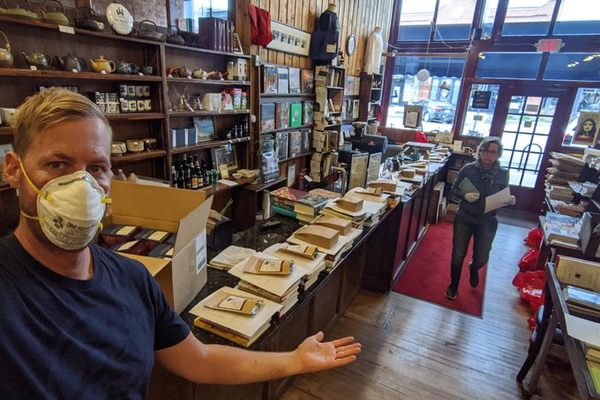



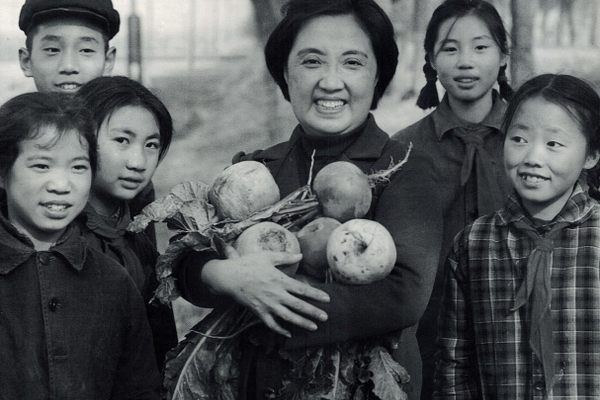




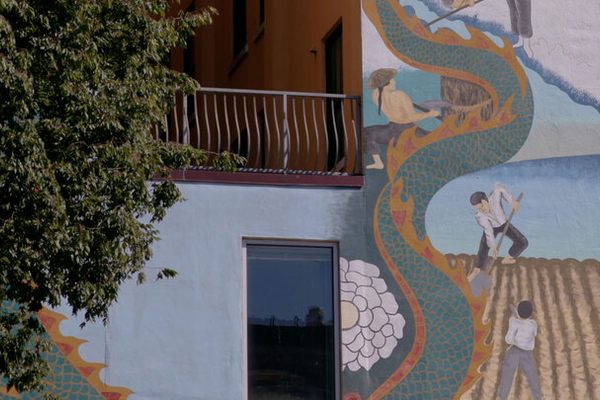










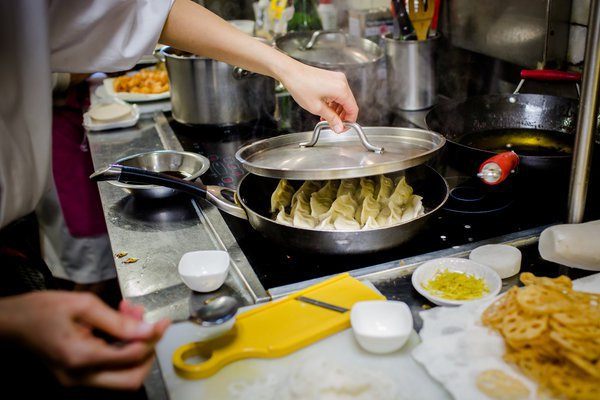

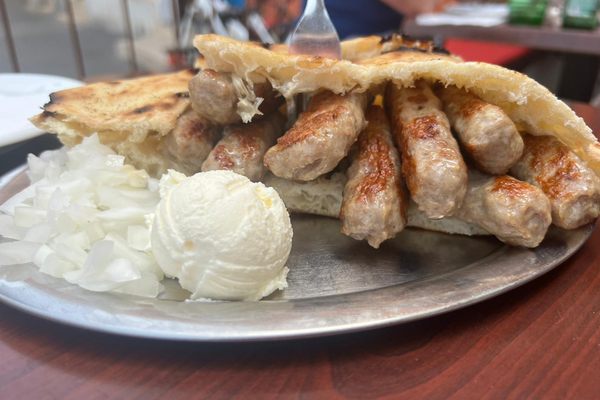


Follow us on Twitter to get the latest on the world's hidden wonders.
Like us on Facebook to get the latest on the world's hidden wonders.
Follow us on Twitter Like us on Facebook